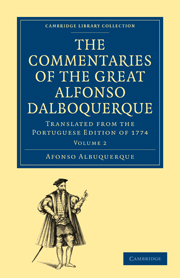 The Commentaries of the Great Afonso Dalboquerque, Second Viceroy of India
The Commentaries of the Great Afonso Dalboquerque, Second Viceroy of India Book contents
- Frontmatter
- Contents
- INTRODUCTION
- CHRONOLOGY OF PART II
- TITLE TO THE EDITION OF 1774–PART II
- TITLES OF THE CHAPTERS CONTAINED IN THE SECOND PART
- MAP OF INDIA
- PART II WHEREIN ARE CONTAINED THE DEALINGS OP THE GREAT AFONSO DALBOQUERQUE WITH THE VICEROY: AND WHAT HE DID AFTER BEING INVESTED WITH THE GOVERNMENT OF INDIA, UNTIL THE FIRST TAKING OF GOA
- CHAPTER I
- CHAPTER II
- CHAPTER III
- CHAPTER IV
- CHAPTER V
- CHAPTER VI
- CHAPTER VII
- CHAPTER VIII
- CHAPTER IX
- CHAPTER X
- CHAPTER XI
- CHAPTER XII
- CHAPTER XIII
- CHAPTER XIV
- CHAPTER XV
- CHAPTER XVI
- CHAPTER XVI
- CHAPTER XVIII
- CHAPTER XIX
- CHAPTER XX
- CHAPTER XXI
- CHAPTER XXII
- CHAPTEE XXIII
- CHAPTER XXIV
- CHAPTER XXV
- CHAPTER XXVI
- CHAPTER XXVII
- CHAPTER XXVII
- CHAPTER XXIX
- CHAPTER XXX
- CHAPTER XXXI
- CHAPTER XXXII
- CHAPTER XXXIII
- CHAPTER XXXIV
- CHAPTER XXXV
- CHAPTER XXXVI
- CHAPTER XXXVII
- CHAPTER XXXVIII
- CHAPTER XXXIX
- CHAPTER XL
- CHAPTER XLI
- CHAPTEE XLII
- CHAPTER XLIII
- CHAPTER XLIV
- CHAPTER XLV
- CHAPTER XLYI
- CHAPTER XLVII
- CHAPTER XLVIII
- CHAPTER XLIX
- CHAPTER L
- CHAPTER LI
- Plate section
CHAPTER VII
Published online by Cambridge University Press: 05 July 2011
- Frontmatter
- Contents
- INTRODUCTION
- CHRONOLOGY OF PART II
- TITLE TO THE EDITION OF 1774–PART II
- TITLES OF THE CHAPTERS CONTAINED IN THE SECOND PART
- MAP OF INDIA
- PART II WHEREIN ARE CONTAINED THE DEALINGS OP THE GREAT AFONSO DALBOQUERQUE WITH THE VICEROY: AND WHAT HE DID AFTER BEING INVESTED WITH THE GOVERNMENT OF INDIA, UNTIL THE FIRST TAKING OF GOA
- CHAPTER I
- CHAPTER II
- CHAPTER III
- CHAPTER IV
- CHAPTER V
- CHAPTER VI
- CHAPTER VII
- CHAPTER VIII
- CHAPTER IX
- CHAPTER X
- CHAPTER XI
- CHAPTER XII
- CHAPTER XIII
- CHAPTER XIV
- CHAPTER XV
- CHAPTER XVI
- CHAPTER XVI
- CHAPTER XVIII
- CHAPTER XIX
- CHAPTER XX
- CHAPTER XXI
- CHAPTER XXII
- CHAPTEE XXIII
- CHAPTER XXIV
- CHAPTER XXV
- CHAPTER XXVI
- CHAPTER XXVII
- CHAPTER XXVII
- CHAPTER XXIX
- CHAPTER XXX
- CHAPTER XXXI
- CHAPTER XXXII
- CHAPTER XXXIII
- CHAPTER XXXIV
- CHAPTER XXXV
- CHAPTER XXXVI
- CHAPTER XXXVII
- CHAPTER XXXVIII
- CHAPTER XXXIX
- CHAPTER XL
- CHAPTER XLI
- CHAPTEE XLII
- CHAPTER XLIII
- CHAPTER XLIV
- CHAPTER XLV
- CHAPTER XLYI
- CHAPTER XLVII
- CHAPTER XLVIII
- CHAPTER XLIX
- CHAPTER L
- CHAPTER LI
- Plate section
Summary
How Francisco de Tavora, owing to some words he had with Jorge de Melo Pereira concerning the great Afonso Dalboquerque, sent him a challenge, and what took place thereafter; and of the arrival of Diogo Lopez de Sequeira in India.
Jorge Barreto and João da Nova were so desirous that the Viceroy should stay in India, for they were the prime movers of this scheme, that they tried every means in their power to move the people to wrath against the great Afonso Dalboquerque. And they kept on going about from house to house, saying to the men that they ought to bear in mind how much they were indebted to the Viceroy, and how much more fitted than Afonso Dalboquerque he was to be Governor of India, and that the Viceroy had assured them that he was determined on no account to deliver up the government, as, indeed, they would soon see, and as things were in this state they ought not to frequent Afonso's house, nor eat with him, for they would thereby be ruining themselves.
Now inasmuch as Francisco de Tavora had been much angered at the Viceroy, and spoke very ill of him, because of injuries he had received at the hands of Jorge Barreto, who wished him harm (for in Ormuz he (Jorge) had stated to Afonso Dalboquerque that the captains had been advised to desert by him), Jorge Barreto did all he could to become reconciled with him, because he feared that as he (Francisco de Tavora) was on friendly terms with Jorge de Melo (who was a great friend of Afonso Dalboquerque, and constantly went to his house), he would be able to reckon him as a friend, and one who would go against the Viceroy.
- Type
- Chapter
- Information
- The Commentaries of the Great Afonso Dalboquerque, Second Viceroy of IndiaTranslated from the Portuguese Edition of 1774, pp. 28 - 32Publisher: Cambridge University PressPrint publication year: 2010First published in: 1877


